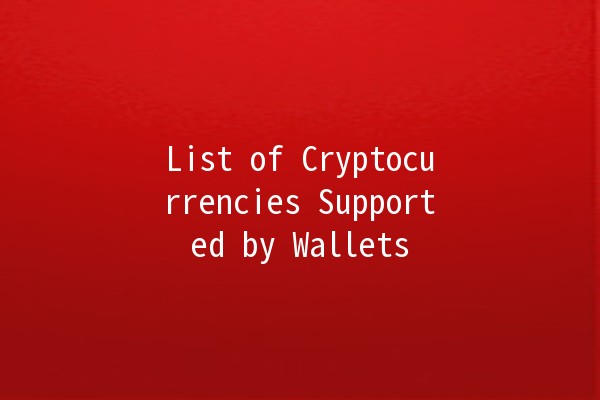




In the everevolving world of cryptocurrencies, knowing which coins are supported by your wallet is essential for managing your digital assets effectively. With hundreds of cryptocurrencies available, selecting the right wallet that supports the coins you wish to hold and trade is crucial. This article delves into the various cryptocurrencies supported by wallets, offering insights, productivity tips, and key information essential for every crypto enthusiast.

A cryptocurrency wallet is a digital tool that allows users to store, send, and receive cryptocurrencies. Unlike a traditional wallet, a crypto wallet does not store coins physically. Instead, it holds the private and public keys necessary to access the cryptocurrency on the blockchain.
About: The original and most known cryptocurrency, Bitcoin is widely supported across various wallets, including hot and cold storage options.
Popular Wallets:
Ledger Nano X: A hardware wallet that ensures security while allowing Bluetooth connectivity for ease of use.
Exodus: A userfriendly hot wallet that supports over 100 cryptocurrencies, including Bitcoin.
About: As the secondlargest cryptocurrency by market capitalization, Ethereum also enjoys widespread wallet support due to its smart contract capabilities.
Popular Wallets:
Trezor Model T: A hardware wallet that supports Ethereum and ERC20 tokens.
Trust Wallet: A mobile wallet that allows easy access to Ethereum and other tokens on the Ethereum network.
About: Known for its digital payment protocol more than its cryptocurrency, Ripple's XRP is favored in the financial sector.
Popular Wallets:
Atomic Wallet: A decentralized wallet supporting Ripple and numerous other cryptocurrencies.
Coinbase Wallet: A userfriendly wallet linked to the Coinbase exchange, supporting XRP.
About: Often referred to as the silver to Bitcoin’s gold, Litecoin offers faster transaction times and lower fees.
Popular Wallets:
Electrum: A lightweight wallet that provides support for Litecoin with advanced security features.
Litecoin Core: The official wallet that provides full control over your LCT holdings.
About: Created as a result of a hard fork from Bitcoin, Bitcoin Cash offers increased block size for faster transactions.
Popular Wallets:
Paper Wallets: A simple and secure method to store Bitcoin Cash offline.
Coinomi: A versatile wallet that supports Bitcoin Cash and multiple other cryptocurrencies.
Effectively managing your cryptocurrency wallet requires strategic planning and productivity awareness. Here are five actionable tips to enhance your wallet management process:
Using multiple wallets can increase security. Consider holding longterm assets in cold wallets while keeping some funds in hot wallets for trading or daily transactions. This approach minimizes risk and allows you to capitalize on market movements.
Example: Use a Ledger Nano S for longterm Bitcoin holding while keeping a Coinbase Wallet for daytoday transactions.
Always enable 2FA for your wallets. This additional security measure helps protect your assets from unauthorized access, especially in hot wallets that are connected to the internet.
Example: When using wallets such as Binance or Coinbase, enable 2FA to safeguard your account.
Ensure that your wallet software is always uptodate. Wallet developers often release updates to fix vulnerabilities or improve performance. Failure to keep software updated exposes you to security risks.
Example: If you use software wallets like Exodus or Trust Wallet, check for updates weekly.
Your private keys grant access to your cryptocurrency holdings. Never share your private keys, and consider storing them in a secure, encrypted location.
Example: Store your private keys in a passwordprotected document or, better yet, a hardware wallet that requires physical access to the keys.
Regularly check your wallet activity to spot any unauthorized transactions quickly. Many wallet services provide notifications for incoming and outgoing transactions.
Example: Set up transaction alerts on your wallet app to stay informed about your assets.
The safest method for storing cryptocurrencies is to use a cold wallet. Cold wallets are not connected to the internet and therefore less susceptible to hacking. Hardware wallets, such as Ledger or Trezor, are highly recommended for longterm storage.
Yes, many modern wallets allow users to store multiple cryptocurrencies. Wallets like Exodus and Trust Wallet support various coins, allowing for easy management of your digital assets.
If you lose access to your wallet, recovery largely depends on whether you have your seed phrase or backup keys. Most wallets provide a recovery phrase when you create them, which can restore your access. If you do not have this information, recovering your assets may be impossible.
No, not all wallets support every cryptocurrency. Each wallet has a specific list of supported coins. It’s important to research and choose a wallet that accommodates the cryptocurrencies you wish to use.
To choose the best wallet, consider the following factors:
The types of cryptocurrencies you want to store.
Your level of experience in managing cryptocurrencies.
The importance of security versus convenience in accessing your assets.
Fees vary from one wallet to another. Some wallets charge transaction fees, while others provide free services but may charge for certain functionalities or trades. Be sure to read the fee structure before selecting a wallet to ensure it fits your financial strategy.
In the dynamic realm of cryptocurrencies, selecting a wallet that efficiently supports your desired coins is paramount. By understanding the nature of different wallets, recognizing the supported cryptocurrencies, and implementing productivityenhancing strategies, you can navigate your cryptocurrency journey more effectively. Stay informed, secure your assets, and continue to explore the exciting world of digital currencies!